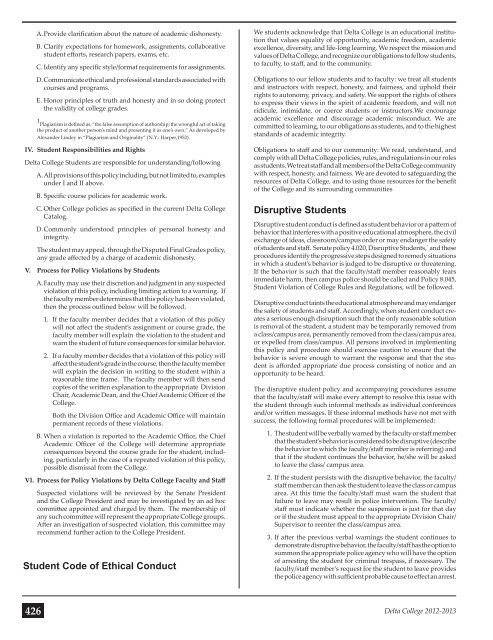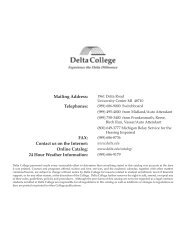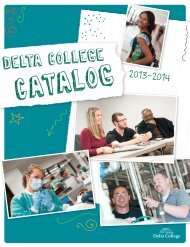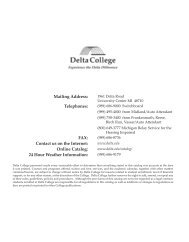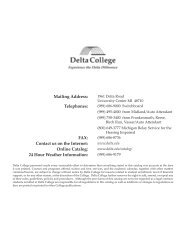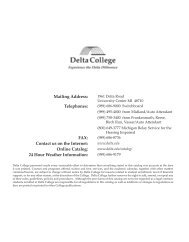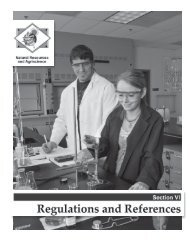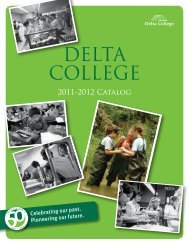2012 - 2013 catalog - Delta College
2012 - 2013 catalog - Delta College
2012 - 2013 catalog - Delta College
Create successful ePaper yourself
Turn your PDF publications into a flip-book with our unique Google optimized e-Paper software.
A. Provide clarification about the nature of academic dishonesty.<br />
B. Clarify expectations for homework, assignments, collaborative<br />
student efforts, research papers, exams, etc.<br />
C. Identify any specific style/format requirements for assignments.<br />
D. Communicate ethical and professional standards associated with<br />
courses and programs.<br />
E. Honor principles of truth and honesty and in so doing protect<br />
the validity of college grades.<br />
1 Plagiarism is defined as, “the false assumption of authorship; the wrongful act of taking<br />
the product of another person’s mind and presenting it as one’s own.” As developed by<br />
Alexander Lindey in “Plagiarism and Originality” (N.Y.: Harper,1952)<br />
IV. Student Responsibilities and Rights<br />
<strong>Delta</strong> <strong>College</strong> Students are responsible for understanding/following<br />
A. All provisions of this policy including, but not limited to, examples<br />
under I and II above.<br />
B. Specific course policies for academic work.<br />
C. Other <strong>College</strong> policies as specified in the current <strong>Delta</strong> <strong>College</strong><br />
Catalog.<br />
D. Commonly understood principles of personal honesty and<br />
integrity.<br />
The student may appeal, through the Disputed Final Grades policy,<br />
any grade affected by a charge of academic dishonesty.<br />
V. Process for Policy Violations by Students<br />
A. Faculty may use their discretion and judgment in any suspected<br />
violation of this policy, including limiting action to a warning. If<br />
the faculty member determines that this policy has been violated,<br />
then the process outlined below will be followed.<br />
1. If the faculty member decides that a violation of this policy<br />
will not affect the student’s assignment or course grade, the<br />
faculty member will explain the violation to the student and<br />
warn the student of future consequences for similar behavior.<br />
2. If a faculty member decides that a violation of this policy will<br />
affect the student’s grade in the course, then the faculty member<br />
will explain the decision in writing to the student within a<br />
reasonable time frame. The faculty member will then send<br />
copies of the written explanation to the appropriate Division<br />
Chair, Academic Dean, and the Chief Academic Officer of the<br />
<strong>College</strong>.<br />
Both the Division Office and Academic Office will maintain<br />
permanent records of these violations.<br />
B. When a violation is reported to the Academic Office, the Chief<br />
Academic Officer of the <strong>College</strong> will determine appropriate<br />
consequences beyond the course grade for the student, including,<br />
particularly in the case of a repeated violation of this policy,<br />
possible dismissal from the <strong>College</strong>.<br />
VI. Process for Policy Violations by <strong>Delta</strong> <strong>College</strong> Faculty and Staff<br />
Suspected violations will be reviewed by the Senate President<br />
and the <strong>College</strong> President and may be investigated by an ad hoc<br />
committee appointed and charged by them. The membership of<br />
any such committee will represent the appropriate <strong>College</strong> groups.<br />
After an investigation of suspected violation, this committee may<br />
recommend further action to the <strong>College</strong> President.<br />
Student Code of Ethical Conduct<br />
We students acknowledge that <strong>Delta</strong> <strong>College</strong> is an educational institution<br />
that values equality of opportunity, academic freedom, academic<br />
excellence, diversity, and life-long learning. We respect the mission and<br />
values of <strong>Delta</strong> <strong>College</strong>, and recognize our obligations to fellow students,<br />
to faculty, to staff, and to the community.<br />
Obligations to our fellow students and to faculty: we treat all students<br />
and instructors with respect, honesty, and fairness, and uphold their<br />
rights to autonomy, privacy, and safety. We support the rights of others<br />
to express their views in the spirit of academic freedom, and will not<br />
ridicule, intimidate, or coerce students or instructors.We encourage<br />
academic excellence and discourage academic misconduct. We are<br />
committed to learning, to our obligations as students, and to the highest<br />
standards of academic integrity.<br />
Obligations to staff and to our community: We read, understand, and<br />
comply with all <strong>Delta</strong> <strong>College</strong> policies, rules, and regulations in our roles<br />
as students. We treat staff and all members of the <strong>Delta</strong> <strong>College</strong> community<br />
with respect, honesty, and fairness. We are devoted to safeguarding the<br />
resources of <strong>Delta</strong> <strong>College</strong>, and to using those resources for the benefit<br />
of the <strong>College</strong> and its surrounding communities<br />
Disruptive Students<br />
Disruptive student conduct is defined as student behavior or a pattern of<br />
behavior that interferes with a positive educational atmosphere, the civil<br />
exchange of ideas, classroom/campus order or may endanger the safety<br />
of students and staff. Senate policy 4.020, Disruptive Students,` and these<br />
procedures identify the progressive steps designed to remedy situations<br />
in which a student’s behavior is judged to be disruptive or threatening.<br />
If the behavior is such that the faculty/staff member reasonably fears<br />
immediate harm, then campus police should be called and Policy 8.045,<br />
Student Violation of <strong>College</strong> Rules and Regulations, will be followed.<br />
Disruptive conduct taints the educational atmosphere and may endanger<br />
the safety of students and staff. Accordingly, when student conduct creates<br />
a serious enough disruption such that the only reasonable solution<br />
is removal of the student, a student may be temporarily removed from<br />
a class/campus area, permanently removed from the class/campus area,<br />
or expelled from class/campus. All persons involved in implementing<br />
this policy and procedure should exercise caution to ensure that the<br />
behavior is severe enough to warrant the response and that the student<br />
is afforded appropriate due process consisting of notice and an<br />
opportunity to be heard.<br />
The disruptive student policy and accompanying procedures assume<br />
that the faculty/staff will make every attempt to resolve this issue with<br />
the student through such informal methods as individual conferences<br />
and/or written messages. If these informal methods have not met with<br />
success, the following formal procedures will be implemented:<br />
1. The student will be verbally warned by the faculty or staff member<br />
that the student’s behavior is considered to be disruptive (describe<br />
the behavior to which the faculty/staff member is referring) and<br />
that if the student continues the behavior, he/she will be asked<br />
to leave the class/ campus area.<br />
2. If the student persists with the disruptive behavior, the faculty/<br />
staff member can then ask the student to leave the class or campus<br />
area. At this time the faculty/staff must warn the student that<br />
failure to leave may result in police intervention. The faculty/<br />
staff must indicate whether the suspension is just for that day<br />
or if the student must appeal to the appropriate Division Chair/<br />
Supervisor to reenter the class/campus area.<br />
3. If after the previous verbal warnings the student continues to<br />
demonstrate disruptive behavior, the faculty/staff has the option to<br />
summon the appropriate police agency who will have the option<br />
of arresting the student for criminal trespass, if necessary. The<br />
faculty/staff member’s request for the student to leave provides<br />
the police agency with sufficient probable cause to effect an arrest.<br />
426 <strong>Delta</strong> <strong>College</strong> <strong>2012</strong>-<strong>2013</strong>


